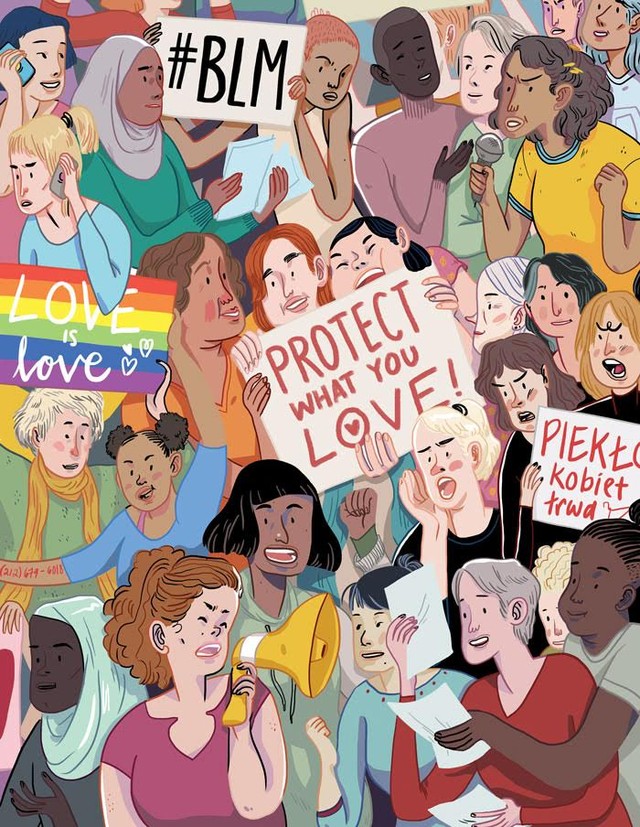Patrisse Cullors was only 17 when she staged her first protest, after getting harassed in a park for being with her girlfriend. In 2013, in the wake of George Zimmerman’s acquittal for killing unarmed black teenager Trayvon Martin, she, along with Alicia Garza and Opal Tometi, helped found Black Lives Matter, an activist movement that now has more than 40 chapters in the U.S., Canada, Australia, and the U.K. Here, she tells us how to actuate change, what women bring to organizing, and how to fight in the face of despair.
How much should intersectionality be considered when organizing?
It should be the basis on which we understand how we organize. We are not one-dimensional. I’m not gonna show up to a conference about race and just talk about being Black. I am a Black, queer woman who was raised poor, and how I organize, understand the world, and how the world understands me is because of all those things.
What tips would you give for making sure groups welcome people of different ethnicities, nationalities, and backgrounds?
There’s no easy answer. On one hand, it’s about the people who are organizing being educated enough about why it’s important that we’re all at the table. On the other hand, it’s about people’s intentions. In this moment, it’s imperative that across race, gender, sexuality, and citizen status, we should be building together. Not to dissolve the specificities that come with being Black or Latinx, but to say we’re up against a bigger problem. Our movements have to come together and figure out, How do we ensure that Trump—and the team he’s built—doesn’t get another four years in office?
What real change have you seen from your BLM work?
We’ve changed the culture. We’ve made it a popular conversation and that is so huge. People believed that the rise of a Black presidency meant that we lived in a post-racial society; I couldn’t disagree more. Black Lives Matter allowed for a new cultural phenomenon around what Blackness is. Our movement has also put elected officials on notice and we’ve seen legislative change. But we’ve also seen a great rise in white nationalism. It’s not a coincidence that a Trump would be able to develop at this time. Historically, whenever Black people have said enough is enough, white nationalism has risen. We can’t divorce history from this moment.
What are the most effective ways BLM has actuated change? Is it social media, organizing in the streets?
It’s all of it. We need to use all tools right now. What a powerful tool social media is, but we also need to be door knocking, meeting our neighbors, having circles, talking, creating together. We need to be able to be responsive, not just on social media but also in the streets. I also think we need an inside/outside strategy. We need to build real political power, whether it’s aligning ourselves with legislators we trust and believe, or taking some of our own folks and saying, “I think it’s time for you to run for mayor, for State Assembly.”
Do you think women bring something unique to community organizing?
Always. And I don’t think it’s because it’s biological, in the sense that we’re natural nurturers. But I do think because of our socialization and our relationship to patriarchy, our understanding of how to bring people together has everything to do with the team versus the I.
What advice do you have for women who want to take action post-election? Where can we start?
Honestly, anywhere. If you have a local Black Lives Matter chapter, join it. Do a Google search: women’s organizations in my city. If they don’t exist, start one. Start a meetup group that’s able to really have a conversation about this current moment; talk about your feelings, process, and then join something that is about changing the current conditions that we live in.
What would you say to those who might feel overwhelmed by the amount of social change work that needs to be done?
Feel overwhelmed. It’s overwhelming. And remind yourself that there are so many more people who want to see this place better off, who want to live in a world where black lives actually matter, where being Muslim doesn’t designate you as terrorist, where your native lands are protected and free from corporations, where children can live their lives without being gunned down in the street. So many of us want to see that. Remind yourself that we can feel overwhelmed today, and then we gotta work tomorrow.
By Lisa Butterworth
Art by Nicole Miles
This piece originally appeared in the February/March 2017 print edition of BUST Magazine. Subscribe today!
More from BUST
The U.S. Prison System Is Failing Trans Prisoners
Vogue Uses Yellowface To Prove Once Again They Don’t Understand Diversity>
Leslie Jones, Why You Gotta Tease Like That?


